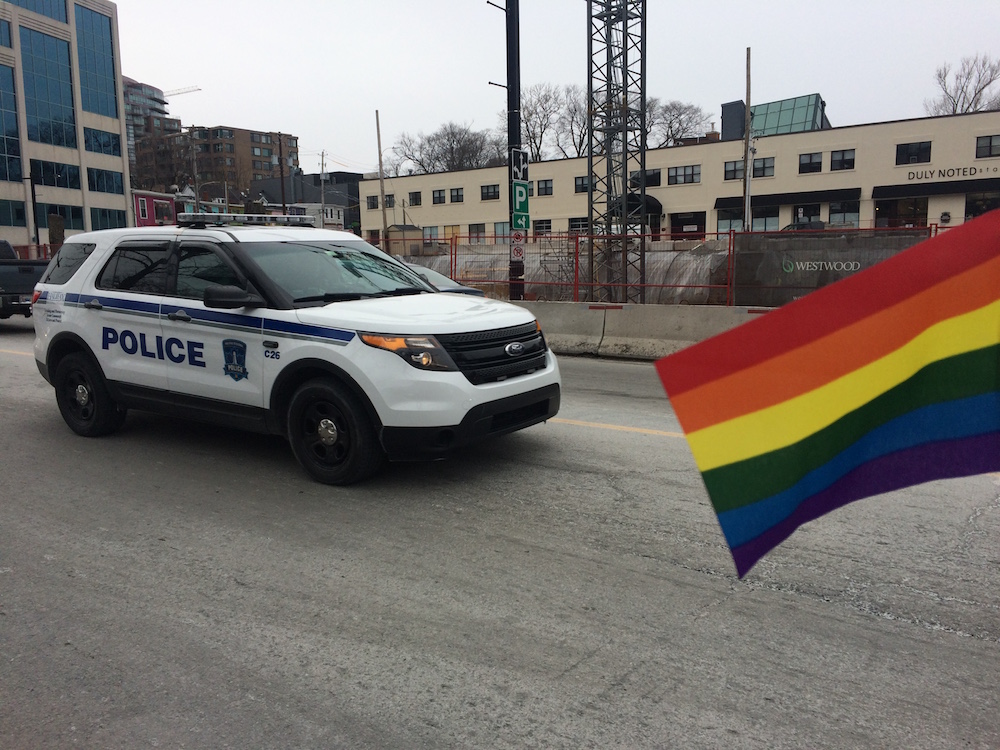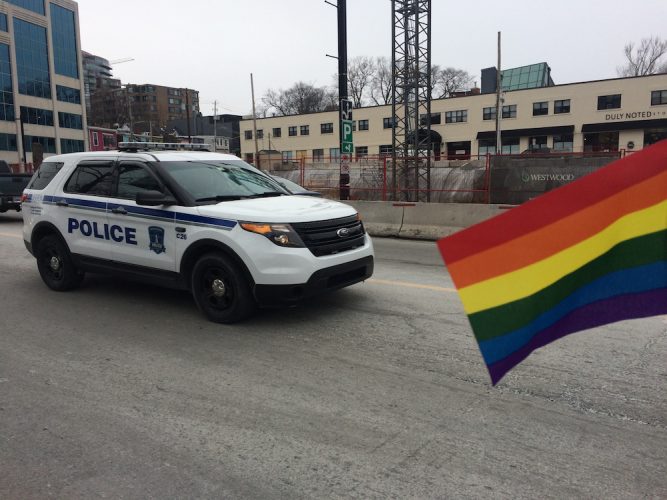Halifax Pride
LGBT2Q+ community discusses police role in Pride
Pride held a working discussion to develop police relationship outside of parade

caption
Photo Illustration. Pride flag held next to HRP car.
caption
Photo Illustration. Pride flag held next to HRP car.Halifax Pride officials met with Halifax Regional Police on Thursday— the first meeting since police announced in February they wouldn’t walk in the annual Pride parade.
Media wasn’t permitted in Thursday’s discussion, but afterwards HRP diversity officer Amit Parasram— who represented the HRP at the meeting— said the HRP is asking the LGBT2Q+ community how it should go forward in Pride.
“We hope the decision that we made will support the community and we hope that it isn’t interpreted as the police department stepping away from the community,” said Parasram. “We’re trying to find a more appropriate and respectful way to support them.”
After Thursday’s meeting, executive director of the Pride Society, Adam Reid, said that Pride and police asked people at the meeting how they would like the police to be involved with Pride Festival— if at all.
They were also asked what topics HRP might discuss in a panel should they hold one and what they think of the participation of other uniformed services at Pride.
An online questionnaire based on Thursday’s meeting was shared Friday on the Facebook event page to hear from LGBT2Q+ community members who didn’t attend the event.
Parasram was asked to sit out during the community feedback portion of the discussion. However, he said that community responses will be sent to the police so they can make decisions about how they will go forth in the festival.
“It’s that continued communication in the conversation that I want to see going forward,” said Reid. “If people are concerned about police relationship with the community then, on behalf of Pride, I want to be at the table to have those conversations with the police.”
Parasram said when they’re finished, he will present these recommendations to the HRP management team.
“If there are some recommendations that we can adopt, we’ll try to do those and honour that relationship building component,” said Parasram.
Reid said that he thinks relationship building between Pride and police is possible, if police listen to community feedback.
“I think we can get to that place if we continue working with police,” he said. “We can offer that input about community concerns.”
Pride Toronto banned the city’s police from marching in their parade less than a month before HRP backed out voluntarily. Last year, Black Lives Matter Toronto requested that police be banned from Pride during the Pride parade sit-in.
Reid said the voluntary withdrawal was the first of a police force in Canada.
Parasram said HRP hopes to participate in the festival in other ways, such as community events. He hopes this will strengthen the HRP’s relationship with Pride in a deeper way.
“When you walk in a parade, you do just that — you walk and then you leave,” said Parasram. “There’s very little interaction between the parade and the people.”
Parasram said that when the HRP started walking in the Pride parade a decade ago, the Queer Black, Indigenous, People of Colour (QBIPOC) community was not consulted.
“There were concerns about issues that were going on, whether that community wanted the police there and if they felt safe marching in the parade if the police were there,” said Parasram.
The discussion of police involvement follows a greater discussion of “pink washing” at Pride.
There is concern that police presence at Pride offers superficial support and minimizes the harm the organization has caused members of the community in the past, including QBIPOC people.
Reid is the first full-time staff member on the Halifax Pride Society’s staff. He said in the past most volunteer work had been directed toward the parade, neglecting other important relationship building events.
“I think there’s been rumblings that this is not sustainable,” said Reid. “You might say issues like pink washing are symptoms of that, and Pride’s incapacity to address community concerns in a timely or efficient manner.”
The meeting responses and questionnaires will be submitted to the HRP by March 30.

